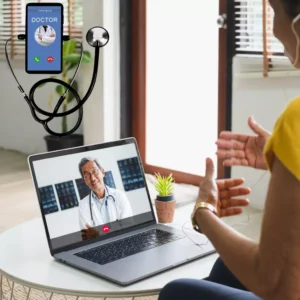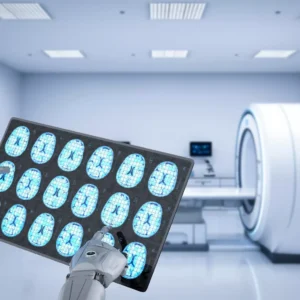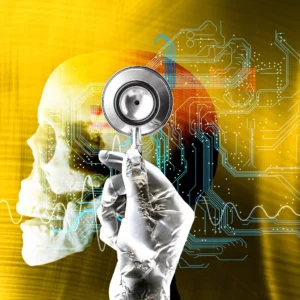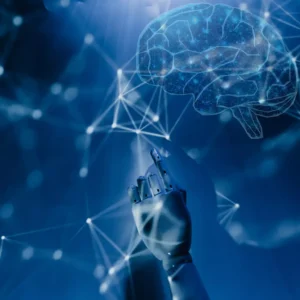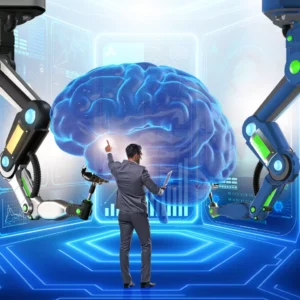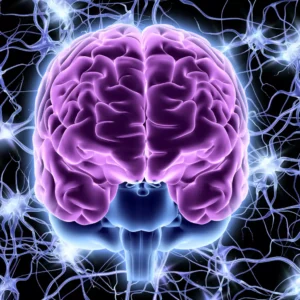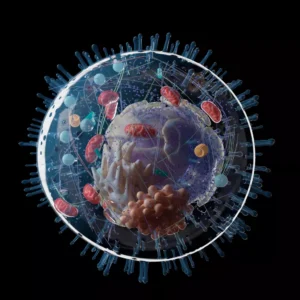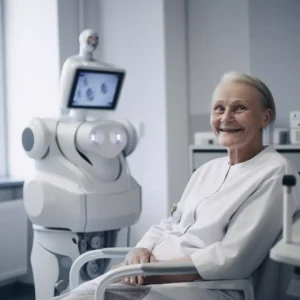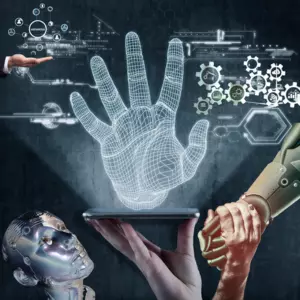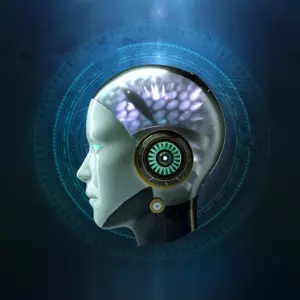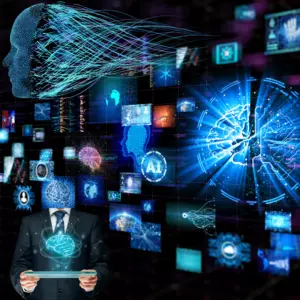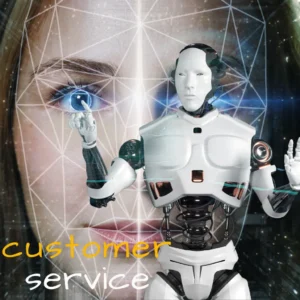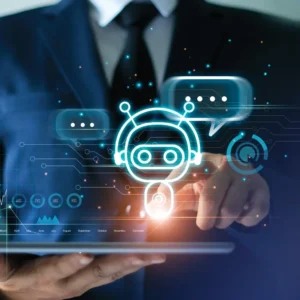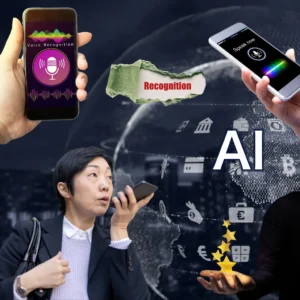
Revolutionizing Personal Health Management
AI in Home Healthcare
In today’s digital age, the power of Artificial Intelligence (AI) is reshaping industries, and Home Healthcare stands out as a noteworthy beneficiary.
The era of visiting clinics for every minor ailment is being replaced by the convenience of AI-driven health monitoring right in the comfort of our homes. From wearable gadgets that track vital stats to virtual assistants guiding our daily health routines, AI is revolutionizing how we perceive and manage our well-being.
But with this immense potential come pressing questions about ethics, privacy, and economic implications. How do we strike a balance between innovation and caution?
This article dives deep into the transformative world of AI in Home Healthcare, offering insights, case studies, and a glimpse into the future trends. Join us as we navigate this intriguing intersection of technology and personal health.
Table of Contents

Arindam Roy
An Automation Consultant with 25+ years of IT Experience
The Rise of Home Healthcare
The healthcare industry has seen a significant shift toward home-based care in recent years, driven by a rapidly ageing population and technological advancements. And in this dynamic transformation, AI in Home Healthcare has emerged as a pivotal player, promising more efficient and effective patient care.
For many, the convenience of AI-driven health monitoring at home has meant fewer hospital visits and earlier detection of health issues. Gone are the days when patients had to wait for their doctor’s appointments for health updates. Today, many devices offer continuous monitoring, delivering real-time data and insights to our fingertips.
By analyzing patterns in health data, these systems can forecast potential health risks, allowing individuals and caregivers to take preemptive measures. This proactive approach is augmented by personalized health alerts, ensuring that patients and caregivers receive timely information tailored to the individual’s health needs.
Enter virtual health assistants at home – AI-powered bots and systems that guide users through daily routines, answer health queries and even remind patients to take their medicines. These assistants play a crucial role in ensuring that home care is not just about monitoring but also about active health management.
Coupled with wearable tech for home health, which can constantly track vital statistics and other health metrics, patients have unprecedented awareness and control over their health. However, as we incorporate these advancements, ethical considerations in AI home care become paramount. How do we ensure that patient data remains private and secure?
The economic ramifications are also profound. As AI streamlines processes and reduces the need for constant physical monitoring, what are the financial implications of AI in home health? Furthermore, how are home healthcare providers trained to integrate these AI tools seamlessly?
While the transformation is undeniable, integrating AI with existing home health systems requires thought and planning. What innovative solutions are paving the way for this fusion, and what does the future hold?
As we delve deeper into this topic, one can’t help but wonder: How will these AI-driven changes redefine our understanding of home healthcare in the coming years?
Enhancing Personal Health with AI Tools
In health, there’s nothing as valuable as timely and personalized care. Herein, AI in Home Healthcare shines as a beacon of modern innovation, offering tools and technologies that can genuinely elevate our health management experiences.
Imagine waking up and being greeted by your virtual health assistant at home, summarising your sleep quality and offering tailored daily advice based on your health metrics. These AI-driven systems learn from your habits, preferences, and health history to provide guidance uniquely suited to you.
However, AI’s brilliance continues beyond mere suggestions. The depth of AI-driven health monitoring at home is impressive. Sensors and devices scattered throughout the house can keep tabs on everything from air quality to your heart rate. When these metrics show abnormalities or potential risks, personalized health alerts notify you, ensuring no issue goes unnoticed.
Now, combine this with the power of predictive analytics for home care. These systems don’t just react to current situations but anticipate potential problems. AI can predict potential health challenges by assessing data trends and using complex algorithms, allowing us to take preventive measures.
The benefits are further amplified by wearable tech for home health. These wearables continuously gather data, whether smartwatches, fitness bands, or bright clothing. They track movements, monitor vitals, and provide information that, when analyzed by AI, can lead to profound health insights.
However, with great power comes great responsibility. As we integrate these AI tools into our daily routines, the ethical considerations in AI home care rise to the forefront. How do we ensure the autonomy of health decisions while benefiting from AI’s guidance?
Moreover, how are we integrating AI with home health systems to ensure a holistic health management experience? And, as we rely more on these tools, what becomes the role of traditional healthcare providers in this AI-driven ecosystem?
Predictive and Real-time Health Insights
The healthcare landscape is undergoing a revolution powered by the potent combination of AI-driven health monitoring at home and advanced data analytics. The fruits of this union are predictive and real-time health insights that hold immense potential in reshaping personal health management.
The beauty of predictive analytics for home care lies in its proactive nature. By sifting through vast amounts of health data, AI can detect patterns and trends, giving users foresight into potential health issues even before they manifest. For instance, by tracking slight changes in one’s heart rate over time, the system might alert the individual to potential cardiovascular risks, allowing them to seek timely interventions.
Yet, while predictive insights prepare us for the future, real-time health feedback keeps us grounded in the present. Devices enabled with AI-driven health monitoring provide instantaneous feedback. Whether it’s a sudden spike in blood pressure, an irregular heartbeat, or even a reminder to hydrate, personalized health alerts keep individuals informed and engaged with their health moment-to-moment.
To complement these insights, wearable tech for home health plays a pivotal role. As users go about their day, these devices continuously collect data, from steps taken to hours slept. This constant stream of information is processed in real-time, ensuring that any anomalies or concerns are promptly addressed.
Moreover, with the rise of virtual health assistants at home, users can easily interpret and act on these insights. They serve as a bridge, turning raw data into actionable advice. But as AI grows more entrenched in our healthcare journey, ethical considerations in AI home care come to the fore. How do we balance predictive accuracy with privacy?
Furthermore, as we leverage these powerful insights, how are we integrating AI with home health systems to ensure cohesive and comprehensive care? What are the unforeseen challenges as we rely more heavily on predictive intelligence for our well-being?
The Role of Virtual Assistants in Home Care
In the rapidly evolving landscape of AI in Home Healthcare, one standout innovation is the virtual health assistant. These AI-powered entities are redefining the paradigm of in-home care, ushering in an era of more accessible, personalized, and efficient health management.
Imagine the convenience of having a health consultant at your beck and call, 24/7. Virtual health assistants at home offer precisely that. Through advanced algorithms and deep learning, these assistants provide advice, set reminders, and answer various health-related questions, becoming a patient’s health guide.
A significant facet of their utility is AI-driven health monitoring at home. Virtual assistants can gather and interpret data by seamlessly connecting with other smart devices in the house, offering personalized health alerts when anomalies arise. Whether it’s a medication reminder or a warning about elevated heart rate, these assistants ensure that vital health information never goes unnoticed.
Their prowess extends to harnessing the power of predictive analytics for home care. Virtual assistants can offer insights into future health scenarios by analyzing past data and current health trends. This capability is precious for individuals with chronic illnesses, allowing for better planning and timely interventions.
Moreover, with wearable tech integration for home health, virtual assistants can provide real-time feedback on a user’s physical activity, sleep patterns, and other health metrics. This continuous stream of insights empowers individuals to make informed health decisions daily.
Yet, as these virtual entities become integral to our health routines, ethical considerations in AI home care must be addressed. How do we ensure that these assistants provide unbiased and accurate information?
Furthermore, as home healthcare providers begin to collaborate more closely with AI systems, how will this synergy influence the broader healthcare landscape? And as we lean more on virtual entities for advice, how do we ensure a human touch remains central to our health journey?
Wearables and Continuous Monitoring
The contemporary age of healthcare is characterized by smart devices that snugly fit on our wrists, seamlessly blending with our daily lives. Wearable tech for home health has become an integral tool, offering a gateway into the transformative world of AI in Home Healthcare.
The true genius of wearables lies in their capacity for continuous health monitoring. From tracking heart rates and oxygen levels to monitoring sleep patterns, these gadgets provide a real-time snapshot of one’s health. This constant data stream is invaluable, especially when integrated with AI-driven health monitoring at home. It means potential health irregularities can be detected almost instantly, paving the way for quick interventions.
Beyond mere data collection, wearables, in conjunction with predictive analytics for home care, hold the power to anticipate health concerns. For instance, by recognizing a consistent decline in a user’s activity levels or irregular sleep cycle, the system can forecast potential health issues and prompt the user with personalized health alerts.
Moreover, when synced with virtual health assistants at home, these wearables transform into comprehensive health management tools. They don’t just collect data; they interpret, analyze, and offer actionable insights, ensuring users remain proactive about their well-being.
However, the convenience of continuous monitoring brings forth ethical considerations in AI home care. The sheer volume of personal data collected by wearables raises concerns about privacy and data security. How do we ensure that this intimate health data remains protected?
Furthermore, as home healthcare providers adapt to this influx of continuous data, how will their roles evolve? Will the traditional check-up become obsolete in the face of real-time health updates? And as we become more dependent on wearables, how do we maintain the crucial human touch and intuition in healthcare decisions?
Addressing Ethical and Privacy Issues
The digital renaissance in healthcare, mainly through AI in Home Healthcare, promises unparalleled advancements. However, with these strides come challenges, chiefly in ethics and privacy. As our homes brim with smart devices, from wearable tech for home health to AI-driven monitoring systems, the concerns around data security and ethical considerations gain prominence.
The heart of the matter is the enormous volume of personal data these systems collect. AI-driven health monitoring at home often means 24/7 surveillance of one’s health metrics. While this continuous stream of information can be life-saving, it also poses risks. How do we ensure that these intimate details, from heart rates to sleep patterns, remain confidential? And beyond confidentiality, there’s the concern of how this data is stored and potentially shared.
Then there are virtual health assistants at home, always ready to provide health advice. While their guidance can be invaluable, ethical considerations in AI home care arise. How can we be sure that the advice provided is unbiased and in the patient’s best interest? And in scenarios where AI predictions might be erroneous, who bears the responsibility?
Furthermore, integrating predictive analytics for home care pushes us to contemplate the fine line between proactive care and determinism. If an AI system predicts a potential health risk, does that unduly influence a patient’s perspective on their health, leading them to anxiety or unnecessary treatments?
Such concerns necessitate a robust framework for training home healthcare providers. Professionals must balance AI’s strengths and limitations to ensure harmony between technology and human judgment as the landscape changes.
But as we grapple with these ethical quandaries, a broader question emerges: As technology becomes more embedded in our daily health routines, how do we maintain the sanctity of patient autonomy, dignity, and informed consent in an increasingly digitized healthcare environment?
Economic Benefits and Challenges
The integration of AI in Home Healthcare has, without a doubt, reshaped the economic landscape of the healthcare industry. The fusion of intelligent technologies and healthcare practices promises significant cost savings, better patient outcomes, and efficient care delivery. Yet, along with the windfall come the sector’s challenges.
One of the primary benefits lies in proactive interventions. Predictive analytics for home care enables early detection of potential health issues, leading to timely treatments and avoiding costly hospitalizations. Similarly, virtual health assistants at home can guide users in maintaining a healthy lifestyle, potentially reducing the future financial burden of chronic diseases.
Wearable tech for home health further aids this economic boost. Continuous monitoring means less dependence on frequent doctor visits. It reduces transportation costs, consultation fees, and the overheads of regular medical checks.
However, the initial investment in these technologies can be steep. For instance, the infrastructure required for AI-driven health monitoring at home demands considerable capital. As we progress in integrating AI with home health systems, the complexities of these systems might necessitate regular upgrades, adding to the ongoing expenses.
Moreover, while AI systems bring efficiency, they raise questions about job displacement in the healthcare sector. As virtual health assistants take over some duties traditionally performed by humans, what does this imply for the job market? Will there be a need to reallocate or retrain healthcare staff?
Furthermore, the ethical considerations in AI home care, especially around data breaches, might lead to potential litigations, posing unforeseen economic challenges.
So, while the economic promise of AI in home healthcare is vast, the road ahead is filled with intricate financial decisions. How will the industry balance leveraging AI’s cost-saving potential and navigating its associated economic challenges? And as consumers shoulder the costs of these technologies, what will be the long-term implications on healthcare affordability?
Training and Education for Home Health Workers
The frontier of AI in Home Healthcare is expanding rapidly, and with it, a knowledgeable workforce that can adeptly navigate this fusion of technology and healthcare is necessary. As with any technological revolution, the key lies in practical Training and continuous education.
First and foremost, introducing AI-driven health monitoring at home means health workers must understand the medical aspects of care and the intricacies of the tech they employ. It’s no longer just about taking vitals but understanding the data streams these AI tools provide and, more importantly, acting on them.
Moreover, the surge in wearable tech for home health and virtual health assistants at home introduces a layer of patient interaction that’s both digital and personal.
Then, there’s the element of predictive analytics for home care. It’s one thing to have predictive data but another to use it judiciously. Training must encompass understanding the nuances of AI predictions discerning the balance between relying on technology and exercising human judgment.
Yet, as we integrate AI with home health systems, addressing ethical considerations in AI home care within the training paradigm is essential. Data privacy, informed consent, and unbiased care delivery become paramount topics in the curriculum for home health workers.
However, amidst all the technicalities, the essence of caregiving should remain untouched. While AI tools and systems play a pivotal role, the human touch, empathy, and understanding are irreplaceable. As training modules evolve, how will they balance tech proficiency with the fundamental principles of patient-centred care?
Case study: A transformative AI home health solution
Imagine Mrs Robinson, a 68-year-old with early-stage Parkinson’s disease. Traditionally, her care would require regular hospital visits, rigorous note-taking, and constant vigilance. But with the integration of a revolutionary AI in the Home Healthcare system, her life and her family’s peace of mind transformed dramatically.
This innovative system comprised wearable tech for home health, which continuously monitored her motor symptoms, offering real-time insights into her condition’s progression. These wearables not only tracked her movements but, using predictive analytics for home care, flagged any deviations suggesting potential complications or the need for medication adjustments.
Moreover, her home was equipped with AI-driven health monitoring devices, tracking vital parameters like heart rate, blood pressure, and sleep patterns. When an anomaly was detected, personalized health alerts were sent to Mrs Robinson and her primary care physician, ensuring timely intervention.
But it wasn’t all about hardware. A virtual health assistant at home became Mrs. Robinson’s companion. It provided medication reminders, offered advice on managing symptoms, and even engaged her in cognitive exercises tailored to her condition while respecting the ethical considerations in AI home care.
Integrated home health systems were implemented to connect Mrs Robinson with expert therapists for her regular physiotherapy needs. These sessions, guided by AI-generated data, ensured her exercises were safe and effective.
The outcome? Mrs Robinson’s care became proactive rather than reactive. Hospital visits reduced, her quality of life improved, and her family could breathe a little easier, knowing they had cutting-edge technology support.
While Mrs Robinson’s story is heartening, it also raises crucial questions. As such transformative solutions become commonplace, how will they reshape the larger healthcare landscape? As these AI systems become deeply embedded in our homes and lives, how do we ensure they evolve to meet diverse health needs while staying grounded in human-centric care?
Looking ahead at home health trends
The landscape of AI in Home Healthcare is ever-evolving. As we stand on the cusp of this digital revolution, several emerging trends promise to refine further and elevate patient care at home.
Firstly, the depth and breadth of AI-driven health monitoring at home are set to expand. Beyond monitoring vital statistics, future systems may predict more nuanced health events, from migraine attacks to mood shifts, using sophisticated predictive analytics for home care.
Wearable tech for home health is anticipated to become even more discreet and user-friendly. Imagine bright tattoos or contact lenses, constantly monitoring, analyzing, and relaying health data without any perceived intrusion. Personalized health alerts will evolve to become more predictive, focusing on immediate issues and forecasting potential future health challenges.
The integration of virtual health assistants at home will delve deeper. Future virtual assistants might understand emotional cues, offering support during anxiety or depression. They’ll evolve to be holistic health companions, understanding individual patient histories, preferences, and even cultural contexts while ensuring to address ethical considerations in AI home care.
Further, as AI and IoT merge, we might see all smart homes designed around the residents’ health needs. Integrating AI with home health systems will be about more than just medical devices but building responsive environments, from lighting that syncs with circadian rhythms to floors that detect falls.
Lastly, a strong emphasis will be on data security and privacy, with innovations ensuring patient data remains confidential while still offering the advantages of AI-driven insights.
But as we navigate this promising horizon, a pivotal question remains: As home healthcare becomes more innovative and more AI-centric, how do we ensure it remains grounded in the core values of empathy, trust, and human connection? And will these innovations be accessible to all or just a privileged few?
In Conclusion
As we journeyed through the myriad facets of AI in Home Healthcare, one thing became abundantly clear: AI’s potential to redefine home-based patient care is immense. The evolution from conventional treatments to AI-driven health monitoring at home is not merely a shift; it’s a quantum leap towards efficient, proactive healthcare.
Stories like Mrs Robinson’s, supported by wearable tech for home health, paint a future where constant monitoring becomes the norm. When married to predictive analytics for home care, these wearables transform reactive medical interventions into foresighted care plans, ensuring timely treatment even before acute symptoms manifest.
Personalized health alerts stand out as another beacon, promising to inform and predict. Foreseeing potential health challenges empowers patients and caregivers to make preemptive decisions. This synergy between AI and healthcare makes real-time interventions and predictive care the gold standards of the future.
But what indeed humanizes these advances are virtual health assistants at home. Their evolution will be beyond just reminders or data points. They’ll emerge as holistic companions, understanding, empathizing, and responding to physiological and emotional needs.
Of course, like all technological revolutions, ethical considerations in AI home care can’t be understated. The balance between innovation and intrusion, efficiency and empathy, is crucial. Our pursuit of integrating AI with home health systems should always prioritize patient dignity, autonomy, and data privacy.
Yet, these challenges are not roadblocks but guideposts. The economic landscape will shift as we forge ahead, revealing both economic benefits and challenges. Embracing AI means leveraging its advantages and navigating its complexities, ensuring that its fruits are accessible and beneficial to all.
Training and education for home health workers will be pivotal to ensure the seamless transition and uptake of these tools. As they are the system’s backbone, their adaptability will determine the success of these innovations.
The horizon of home healthcare dappled with AI-driven solutions, beckons promisingly. But the overarching question remains: As we march into this brave new world, can we ensure that our strides are as grounded in humanity as they are in technology?
Related Articles
- AI in Telehealth: Revolutionizing Remote Care
- Navigating the Next: AI’s Role in Healthcare Predictive Analytics
- Transforming Medical Imaging with AI Capabilities in Radiology
- AI in Genetic Data Analysis: Personalizing Medicine
- AI in Diagnostics: A New Era of Precision and Accuracy
- Smart Hospitals: The Role of AI in hospital operations
- Mental Health Tech: AI-powered Mental Health Apps for Assessment and Therapy
- AI-Powered Drug Discovery: A Revolution in Pharma
- Medical Robots Enhanced by AI: Transforming Surgeries and Care
- Wearable Health Tech: AI-driven health wearables
- AI’s role in chronic disease management
- Neural Interfaces and AI: Bridging Minds and Machines
- Digital Health Platforms: The Power of AI Integration
- AI in Epidemiology: Predicting and Controlling Outbreaks
- AI in Rehabilitation: Personalized Recovery Pathways
- AI in Predictive and Preventive Care: A Proactive Approach
- AI in Home Healthcare: Personal Health Management
- Revolutionise Healthcare with IPA Tools: Streamlining Processes, Improving Efficiency, and Enhancing Patient Care
- Other Articles on AI Usage in Healthcare
- Other Articles on AI usage in different industries
Forbes Articles related to AI usage in Healthcare:

